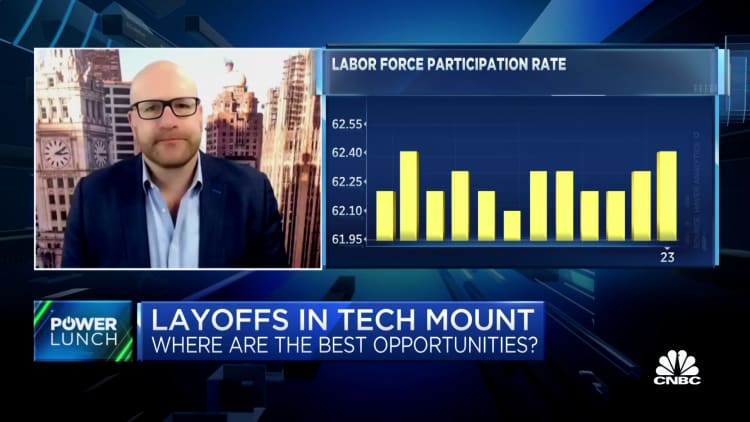
Dimitri Otis | Getty Images
A global pandemic and a possible U.S. recession are reshaping the workforce, but the impact of Gen Z may be greater than both.
Top HR executives are taking notice and adapting their recruiting and employee management practices around not only the needs but desires of this younger class of workers. This is a clear generational divide, said Don Robertson, executive vice president and chief human resources officer at Northwestern Mutual.
“This generation isn’t like previous generations, they know, they want to make an impact,” he said. “They want to connect with leaders, they want to be interacted with, they want it to be very personal and very intimate.”
The professional intimacy and connectedness that Gen Z seeks in the workplace is something that Robertson said has caused a break in the traditional employee-leadership relationship.
Having lived through the Covid-19 pandemic that modernized the way they learned and worked, Gen Z is charging through the workforce and reimagining what it means for companies to take care of their employees.
These younger workers have been characterized by their willingness to leave jobs that don’t provide enough personal help and professional development. The key to retaining them in the years ahead, said experts, is making their jobs about more than a good salary.

Their asks are pretty straightforward.
Apple Musni, vice president and people partner at Chipotle, has broken down the key wants of this younger generation into three areas.
“It’s mental well-being, an equitable and socially responsible workplace, and then pay,” she said.
Musni said that although these three aspects of a job are something that previous generations have also considered important, Gen Z has turned these workplace characteristics into “a must-have and a business requirement rather than a nice-to-have.”
Prioritizing mental health concerns
As the pandemic forced Gen Z into remote learning and working environments, the need for employers that can accommodate rising mental health concerns is a crucial deciding factor for Gen Z applicants.
What is most often missing from these conversations, Robertson said, is providing the space for workers to regain autonomy over not just their work but their lives as well.
According to Robertson, companies can help workers reclaim that control by being flexible about things like mandatory in-office days and allowing parents to adjust their schedules to attend to caregiving responsibilities.
Pay transparency and growth opportunities
States like New York and California are requiring companies to list salary ranges to bring more transparency to wages.
“I think whether it’s on the job description, like some states have mandated, or through the recruiting process, pay transparency is critical,” Musni said.
However, this is just one part of the plan to attract talent, she added. The key to retention is offering a clear path for growth within the organization.
“Pay is one of those benefits that allows you to attract, but I think what really retains talent are growth opportunities, the culture that we have in our organization, and then continuing to evolve our employee value proposition, and meeting teams where they matter most,” Musni added.
Robertson agrees, and said that alongside these growth opportunities, the most important thing for Gen Z workers is providing opportunities for them to connect.
“It’s all about building relationships, helping them develop and building inclusivity,” he said. “They want to be included, they want to make an impact, and they want to be part of something that’s making an impact.”
To join the CNBC Workforce Executive Council, apply at cnbccouncils.com/wec.
